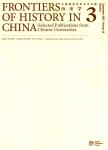Corrupted Infrastructure: Imperialism and Environmental Sovereignty in Shanghai, 1873-1911
Corrupted Infrastructure: Imperialism and Environmental Sovereignty in Shanghai, 1873-1911作者机构:Depa15maent of History University of Birmingham Edgbaston B 15 2TT UK
出 版 物:《Frontiers of History in China》 (中国历史学前沿(英文版))
年 卷 期:2015年第10卷第3期
页 面:428-456页
学科分类:12[管理学] 1204[管理学-公共管理] 08[工学] 081303[工学-城市规划与设计(含:风景园林规划与设计)] 0813[工学-建筑学] 0833[工学-城乡规划学] 083302[工学-城乡规划与设计]
主 题:Boxer Protocol corruption infrastructure Gu Hongming Huangpu River new policies Self-Strengthening Sino-French War
摘 要:The introduction of Western science in order to change physical and operational aspects of Shanghai's Huangpu River had been debated by Qing and Western officials since almost the beginning of its history as a Treaty Port. At stake in those debates was the perception of the river's proper use: as a natural barrier for military defense, or as a conduit for global trade. After the Western powers unified to militarily suppress the Boxer Uprising in 1900, they attained their long-awaited goal of the right to transform the river for global trade as part of Article 11 of the Boxer Protocol: the Junpuju (or Huangpu Conservancy Board) was created and authorized by the central government to make the Huangpu River navigable for shipping vessels. Although the Junpuju continued the ethos of earlier extra-bureaucratic organizations established during the Self-Strengthening Movement, after 1901 the organization bore the authority of the central government. During the era of the New Policies, Qing officials were intent on revising the original terms of river conservancy so that they would be more favorable to Chinese sovereignty. At the same time, imperialist rivalries among the Western powers ruptured the apparent unity of the earlier alliance during the suppression of the Boxer Uprising. Before long, Western corruption in the Huangpu River dredging was brought to the attention of Qing officials, who deftly used it to recover Qing control over certain parts of the body of the river.



